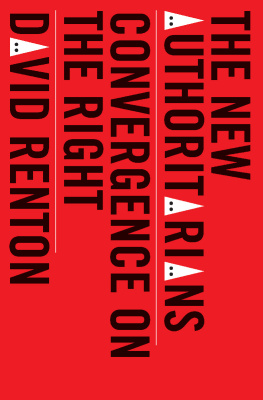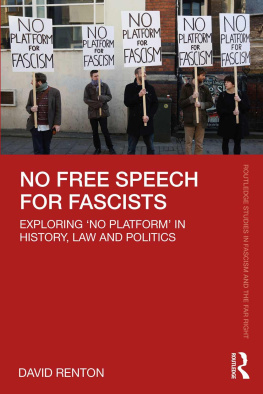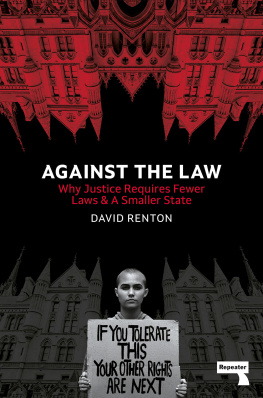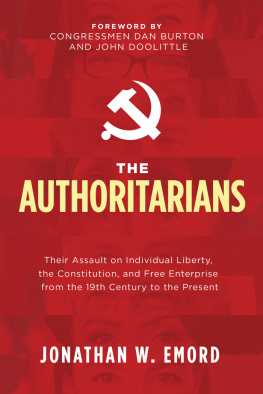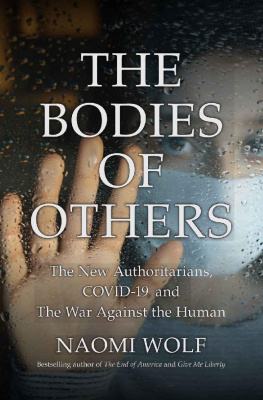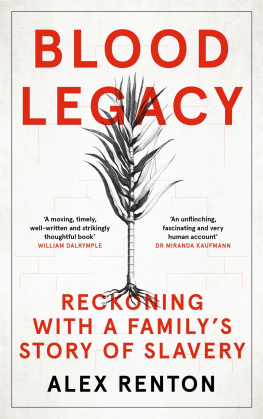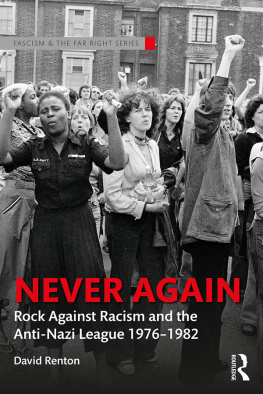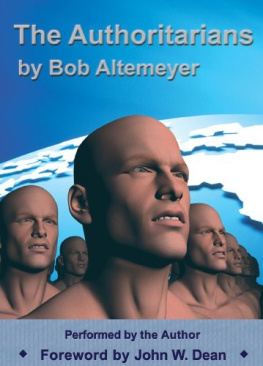David Renton - The New Authoritarians: Convergence on the Right
Here you can read online David Renton - The New Authoritarians: Convergence on the Right full text of the book (entire story) in english for free. Download pdf and epub, get meaning, cover and reviews about this ebook. year: 2019, publisher: Haymarket Books, genre: Politics. Description of the work, (preface) as well as reviews are available. Best literature library LitArk.com created for fans of good reading and offers a wide selection of genres:
Romance novel
Science fiction
Adventure
Detective
Science
History
Home and family
Prose
Art
Politics
Computer
Non-fiction
Religion
Business
Children
Humor
Choose a favorite category and find really read worthwhile books. Enjoy immersion in the world of imagination, feel the emotions of the characters or learn something new for yourself, make an fascinating discovery.
- Book:The New Authoritarians: Convergence on the Right
- Author:
- Publisher:Haymarket Books
- Genre:
- Year:2019
- Rating:4 / 5
- Favourites:Add to favourites
- Your mark:
- 80
- 1
- 2
- 3
- 4
- 5
The New Authoritarians: Convergence on the Right: summary, description and annotation
We offer to read an annotation, description, summary or preface (depends on what the author of the book "The New Authoritarians: Convergence on the Right" wrote himself). If you haven't found the necessary information about the book — write in the comments, we will try to find it.
The New Authoritarians: Convergence on the Right — read online for free the complete book (whole text) full work
Below is the text of the book, divided by pages. System saving the place of the last page read, allows you to conveniently read the book "The New Authoritarians: Convergence on the Right" online for free, without having to search again every time where you left off. Put a bookmark, and you can go to the page where you finished reading at any time.
Font size:
Interval:
Bookmark:

The New Authoritarians
2019 David Renton. Originally published in 2019 by Pluto Press, London.
This edition published in 2019 by
Haymarket Books
P.O. Box 180165
Chicago, IL 60618
773-583-7884
www.haymarketbooks.org
info@haymarketbooks.org
ISBN: 978-1-64259-004-3
Distributed to the trade in the US through Consortium Book Sales andDistribution (www.cbsd.com) and internationally through Ingram PublisherServices International (www.ingramcontent.com).
This book was published with the generous support of Lannan Foundationand Wallace Action Fund.
Special discounts are available for bulk purchases by organizations andinstitutions. Please call 773-583-7884 or email info@haymarketbooks.orgfor more information.
Library of Congress Cataloging-in-Publication data is available.
For several years the centre right and the far right have been co-operating, forming a new and unprincipled alliance. None has prospered in recent years, not even in the favourable circumstances since 2016.
Jobbik has been trying to reinvent itself as a purely parliamentary movement, using a language of detoxification similar to that of Marine Le Pens Front National, claiming to reject anti-semitism in favour of Islamophobia and standing down its militia. This has led to splits within Jobbik. A more militant faction broke off to form the Force and Determination party to the right of Jobbik. Yet in the most recent elections Jobbiks vote fell, leading to yet another split between hardliners and moderates.
As for Golden Dawn, this is a party which has insisted on its National Socialism and loyalty to Hitler. It has organised torchlight processions, complete with fascist salutes and a meander flag similar to a swastika. In 200810, Golden Dawn established its Athens base through the formation of a citizens committee, which was obsessively concerned with the supposed Islamisation of the city. In 2011, supporters of the committee carried out a pogrom against Afghans and other migrants. Since 2016, however, Golden Dawn has been struggling following the arrest of its leader Nikolaos Michaloliakos for the murder of the anti-fascist rapper Pavlos Fyssas. The trial began in 2017 and at the time of writing was still ongoing.
Among Our Slovakias candidates have been Rastislav Rogel, the former singer from the Neo-Nazi band Juden Mord (Death to the Jews). After the party secured 8 per cent of the vote in November 2016, there were mass anti-fascist protests and Our Slovakias leader Marian Kotleba was charged with using Nazi symbols. In regional elections in November 2017, the partys vote fell sharply.
Even those traditions which seem to struggle the hardest under the weight of their own history can on occasion reject the borrowed slogans, old costumes, and cramped spirits of past generations. Later sections of this book explore the history of the MSI/AN in Italy and the events of the 2017 elections in France to describe the main way the right has been turning away from fascism, i.e. through a sustained turn to electoral politics, which compels even former fascists to treat the liberal state as the sole terrain for politics.
There is also a second, subtler but more significant way in which the fascist-inflected far-right of the 1960s and 1970s has given way to something new. For those on the immediate post-war right who wished to carry out attacks on their left-wing opponents or on blacks or Jews or who had romantic visions of a revolutionary war against the state, the virtue of fascism was that it provided a philosophy of action which could justify the adoption of violence and the defeat of their enemies. This decision was reinforced by reminders of fascism which were all around them. The founder of the American Nazi Party, George Lincoln Rockwell, converted to fascism in 19523, during a year spent at the Keflavik Naval Station in Iceland, during which he read and reread Mein Kampf. During the same years Rockwell met his wife, Thora, who he was able to take on a honeymoon to Berchtesgaden, Hitlers mountain retreat.
In Italy, fascists maintained an underground memory of the final years of Mussolinis regime, telling themselves that his (Nazi-backed) Republic of Sal had been a radical regime, the authentic successor to Mussolinis pre-1914 socialist ideas. Numerous of the far-right cadres of the 1960s were the sons of unrepentant fascists, defending the legacy of past
Everywhere in Europe, the immediate post-war fascist parties had similar links with the past, whether that was the presence in their leadership of veteran fascists, funding from similar sources, or support from the children of interwar fascists.
Today, by contrast, more than 70 years have passed since the end of the war and legends of Hitler or Mussolini or their supporters play a smaller part in the memory of the US and European right than they once did.
The presence of fascism within the far right is shaped by the way in which society as a whole remembers the Second World War. As the latter fades from our collective memory, so its relevance to the far right also diminishes. The war has not disappeared; it is still a presence in popular culture, in films and novels and computer games, and it continues to structure conventional as well as far-right politics. It has been joined in the Western imagination by the legacy of 9/11 and the fear of Islamic terrorism. The mainstream has persuaded millions that Islam is a mortal threat. These dynamics in turn shape the far right. Since 2001, much of the growth of the far right can be seen through the success of street-fighting groups, not connected to any party but to identitarian racism. The tradition of fascism and Nazism has been subordinated. Fascism is still a part of the far right but it has ceded its primacy to other organising models better directed to the crisis of our times.
One metaphor which captures something of how we assume memory works is a flashbulb; of the Second World War differs from this model in at least two respects. First, the intensity with which the war has been recalled did not begin at its sharpest only to disappear soon after. If anything, the memory increased in the post-war years, so the war was a more immediate presence in popular consciousness in the 1970s and 1980s than it had been before. Second, what and who we remember has changed. There was not a single flashbulb moment but many different flashes all at once. Some have faded much faster, while others are more visible now than they were in 1945. When most people think about the war today they remember different people and events from those that mattered to previous generations.
In Britain, the war was understood in its aftermath as a heroic struggle in which the country had stood alone against an enemy which had occupied most of Europe. In countries liberated by foreign troops, such as Italy or France, the most important memory was the story of the domestic resistance to fascism. Communists were an important part of this wartime story and remained so at least until 19478 and the start of the Cold War. Yet other stories were ignored. Everyone knew that millions of Jews had died, yet no one seemed capable of accepting how they had died or the part played in their murder
Elsewhere, indifference gave way to hostility. In August 1947, Britain suffered its first post-war race riots, their victims were British Jews, variously blamed for the murder of two British sergeants by supporters of the Zionist Irgun movement. Slaughtermen in Birkenhead refused to process meat for kosher slaughter. Crowds in Manchester broke the windows of Jewish shops and tore down the canopy on the Cheetham Hill Road synagogue. Supporters of the pre-war British fascist Oswald Mosley held meetings across a dozen London sites, the largest of them in South Hackney with up to three thousand people at a time listening to Mosleys speeches.
Font size:
Interval:
Bookmark:
Similar books «The New Authoritarians: Convergence on the Right»
Look at similar books to The New Authoritarians: Convergence on the Right. We have selected literature similar in name and meaning in the hope of providing readers with more options to find new, interesting, not yet read works.
Discussion, reviews of the book The New Authoritarians: Convergence on the Right and just readers' own opinions. Leave your comments, write what you think about the work, its meaning or the main characters. Specify what exactly you liked and what you didn't like, and why you think so.

